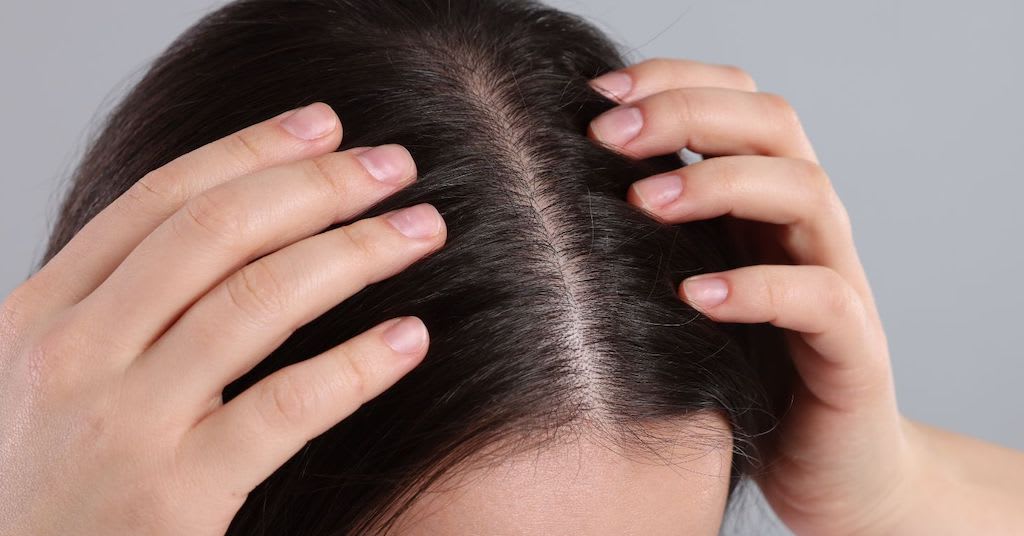Losing weight is no easy feat. The long hours at the gym, saying no to your favorite foods, and staying disciplined on your diet all pay off when you step on the scale and see the numbers going down. As exciting as it is to watch the pounds melt away, you might start noticing something else happening, too—your hair seems to be disappearing with those pounds.
If you've spotted more hairs than normal in your hairbrush or clogging up the shower drain after ramping up your weight loss efforts, you're not imagining things. The connection between weight loss and hair loss is real and it's called telogen effluvium.
Let’s explore why weight loss and hair loss go hand-in-hand, what telogen effluvium symptoms look like, and how to manage this situation for healthier hair.
Why Does Losing Weight Make Your Hair Fall Out?

The connection between weight loss and hair loss comes down to your body’s response to changes such as reduced calorie intake, nutrient deficiencies, and stress. These factors can interfere with the natural hair growth cycle, triggering telogen effluvium symptoms. 1
Telogen effluvium is a temporary condition where a higher-than-normal percentage of hair follicles enter the resting (telogen) phase. This causes more hair to shed and leads to noticeable thinning over time. Essentially, your body goes through an adjustment period during weight loss, and your hair may temporarily react by shedding more than usual. 1
Nutritional Deficiencies
When losing weight, especially through restrictive diets, your body may not get the nutrients it needs to support hair growth. Key nutrients like iron, zinc, and protein are essential for maintaining healthy hair:
- Iron: Hair follicle cells divide and grow quickly, and iron helps with this process by supporting DNA production. Researchers also found that certain genes in hair follicles might depend on iron to function properly. Without enough iron, hair loss can occur because these essential processes are disrupted.
- Protein: A lack of protein in your diet can lead to hair thinning and increased hair loss.
- Zinc: Zinc is involved in the pathways responsible for forming and maintaining hair follicles. 2
Studies show that these deficiencies are strongly linked to telogen effluvium symptoms, making proper nutrition essential for preventing hair loss. 2
Calorie Restriction and Rapid Weight Loss
Hair growth requires a lot of energy. The part of the hair follicle that produces new hair, called the hair matrix, has one of the fastest cell turnover rates in your body. To support this rapid production of new cells, the hair matrix needs plenty of nutrients and energy. 1
When you slash your calorie intake for weight loss, the hair matrix slows down. Hair stays in the resting phase longer before new growth pushes it out. Eventually, hair thinning becomes noticeable. 1
The good news? The negative link between weight loss and hair loss is usually temporary. Once you restore your calorie intake to a healthy level, even while maintaining your weight loss, your hair follicles will start to regenerate, and hair growth should resume. 1
What Are Telogen Effluvium Symptoms?
Weight loss and hair loss go hand-in-hand due to a condition called telogen effluvium. This temporary condition causes noticeable shedding due to a larger-than-normal percentage of hair follicles entering the resting (telogen) phase. 2
Watch for these telogen effluvium symptoms:
- Strands falling out in clumps during brushing or showering. You may notice more hairs than usual gathered in your brush or drain.
- Hair thinning all over your head.
- Lots of hairs shed daily. You may see more hairs than normal on your pillow or clothing. 2
Will Your Hair Grow Back?
The good news is that the unwanted link between weight loss and hair loss is usually temporary. Research shows that once issues like nutrient deficiencies or hormonal imbalances are addressed, the hair growth cycle can normalize. However, visible regrowth may take three to six months. 3
Here are some ways you can support hair regrowth:
- Eat a balanced diet to replenish essential nutrients.
- Manage stress to reduce disruptions to the hair growth cycle.
- Be gentle with your hair and avoid damaging styling habits.
- Consult your doctor about hair loss treatments like minoxidil or finasteride.
Steps to Manage Hair Loss After Weight Loss

If you’re dealing with the unwanted link between weight loss and hair loss, these steps can help:
- Lose weight gradually: Rapid weight loss is more likely to trigger telogen effluvium symptoms. 1
- Consider supplements: If you’re struggling to meet your nutritional needs through food, supplements can help fill the gaps. Consult with a doctor to determine the right supplements for you. 2
- Manage stress: Stress is a common trigger for telogen effluvium symptoms. 1 Incorporate stress-reducing techniques like yoga, meditation, or regular exercise into your routine to improve your overall well-being.
- Avoid harsh hair styling: Avoid excessive heat styling, harsh chemical treatments, or tight hairstyles that can further damage hair that’s already shedding.
When to Seek Help for Hair Loss
If you're experiencing ongoing hair loss or your hair loss is accompanied by other concerning symptoms, it may be time to schedule an appointment with your doctor or dermatologist. Persistent hair shedding or thinning hair, especially when paired with fatigue, scalp discomfort, or other issues, warrants a medical evaluation.
During your appointment, your doctor can order blood tests to check for potential underlying causes like iron deficiency anemia, thyroid disorders, or chronic telogen effluvium. 2
Conclusion
While losing weight can feel like a triumph, noticing increased hair shedding afterwards can feel disheartening. However, understanding the link between weight loss and hair loss provides you with the knowledge to address the issue.
The connection between weight loss and hair loss is often temporary, and the good news is that recovery is within reach. Achieving healthier, fuller hair starts with a holistic approach: nourish your body with a balanced diet, manage stress effectively, and prioritize a gentle hair care routine.
If hair loss continues or you notice concerning symptoms, consider seeking professional advice from your doctor. Additionally, explore trusted solutions through MailMyMeds to support your journey to healthier hair.
The content in this article is intended for informational purposes only. This website does not provide medical advice. In all circumstances, you should always seek the advice of your physician and/or other qualified health professionals(s) for drug, medical conditions, or treatment advice. The content provided on this website is not a substitute for professional medical advice, diagnosis, or treatment.






